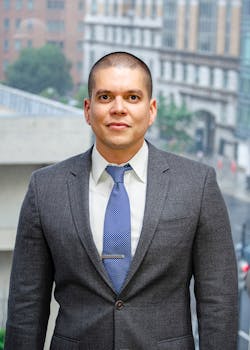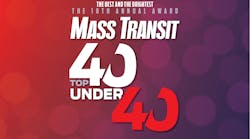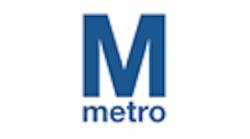- One word to describe yourself: Determined
- Alma Mater: Catholic University of America
- Favorite hobby(s): Traveling overseas and learning about new cultures
- Favorite station or stop that you have ever visited or frequent (and why): Washington, D.C.'s Union Station - "To me, it represents an important transportation hub in the District of Columbia."
Angel Peña is a leader with vision, scope purpose and an accountability that will create an environment of positive change. With a broad range of private and public work experience Peña has brought best practices of data collection, analysis and practical execution to a property that for many years had underinvestment in state of good repair and has used that data to allow Metro to begin smart targeted investment and transparent accountability.
Peña had the unique ability to drive change in an effective and efficient manner. He has the ability to define a clear and distinct vision that he can then translate to those in all levels of the organization to create a collaborative working environment that seeks quality at its core.
Peña’s work products are well documented. His efforts to lead resolution and address the Federal Transit Administration’s safety directives and provide that information for unencumbered public consumption and interpretation is included in Metro's website. Most of his efforts are provided for public review and he is able to translate those highly technical issues to a format that is readily understood by the general public.
He deployed and led the first-ever 21 internal reviews of Metro's transit functions (engineering & maintenance, passenger service delivery, capital program management and execution, safety & security) to ensure delivery on management priorities, commitments and corrective actions. Reinforced organizational improvement efforts through leading the coordination with internal departments to develop 69 internal corrective and preventive actions (iCAPAs).
He led the team that provided quality assurance and inspections during and after the authority’s first system-wide year-long shutdown of the rail service called SafeTrack that reversed years of deferred maintenance and provided a post assessment to stakeholders and passengers on the next level maintenance requirements to maintain a state of good repair.
He launched a new quality assurance framework that includes all Metro assets (rolling stock, new vehicle, guideway, systems and facilities) that leads to greater maintenance group accountability and deliver service improvements to our passengers.
Peña led the approach for the compliance and closure of more than 140 safety directives and recommendations from the Federal Transit Administration (FTA) and the National Transportation Safety Board (NTSB), by working across all disciplines across the authority to coordinate actions plans and establishing a tracking and monitoring. He led the development and implementation of Metro progress status online tracker for FTA/NTSB and Internal corrective actions to enhance organizational accountability and transparency to the public, board members, and regulators by reporting the status of on-going corrective actions weekly.
He unveiled and deployed the first-ever agency-wide Quality Management System Plan (QMSP), which establishes measurable goals and standards consistent across the agency, with a road map to contribute to improving the quality, safety and reliability of service.
Peña holds a degree in industrial engineering and a master's in engineering management and strives to allow those who he serves as a leader to take every opportunity to learn and develop their skills.
"Growing up and seeing my parents and grandparents working hard and being committed to excellence in all they did, served as the catalyst that propelled me to accept challenges in my career. Both my mother and father are engineers and this is one of the main reasons I chose engineering as a profession. I watched my mother grow as a leader in engineering, a field that is dominated by men. She had to work much harder than her male counterparts and did not lose focus on her objective. Her diligent efforts helped her succeed and become a leader in the education of engineers, teaching at a university and ultimately becoming the Dean at the school of engineering. Their example inspired me to overcome the obstacles, criticism and to be determined to accomplish my goals."
"In my current role as the managing director of the office of Quality Assurance, Internal Compliance and Oversight (QICO), I am fortunate to have the opportunity to serve the dedicated people in my department, to be able to provide guidance and direction, inspiration and counsel. QICO is responsible for ensuring good stewardship of public assets. But most importantly, we are one of many groups that understand the responsibility we have when we take patrons into our care and custody as they travel through the system in the nation’s capital."
"There are many complexities about the transit industry. The processes, procedures and talent necessary to safely move over a million people this day in the Washington metropolitan region is a complex and highly integrated mechanism that requires a lot of cooperation between many stakeholders. Therefore, I am committed to providing a clear message to drive improvements. QICO is responsible for the review of those processes and procedures as well as testing compliance. We assess what the agency is doing well, what are the best practices that we can learn from and how we can improve. However, we must also balance the fact that their work is difficult under the best of circumstances so I need to deliver a message that recognizes their efforts while being respectful of the work they perform daily by moving people safely."
"I am proud to have the opportunity to lead by helping the agency to do their work better, safer and more efficiently while being transparent to the riding public."
"Since very early in my career, I learned the dangers of taking shortcuts, the importance of working hard and the need to communicate clearly. You can have a positive (or negative) impact on those people you come in contact with and how you engage them can also impact those who they engage on a daily basis. Be ready to accept the challenge and to make a difference."
"Public Transit provides equality and is essential so all citizens have access to the opportunities in this country."





